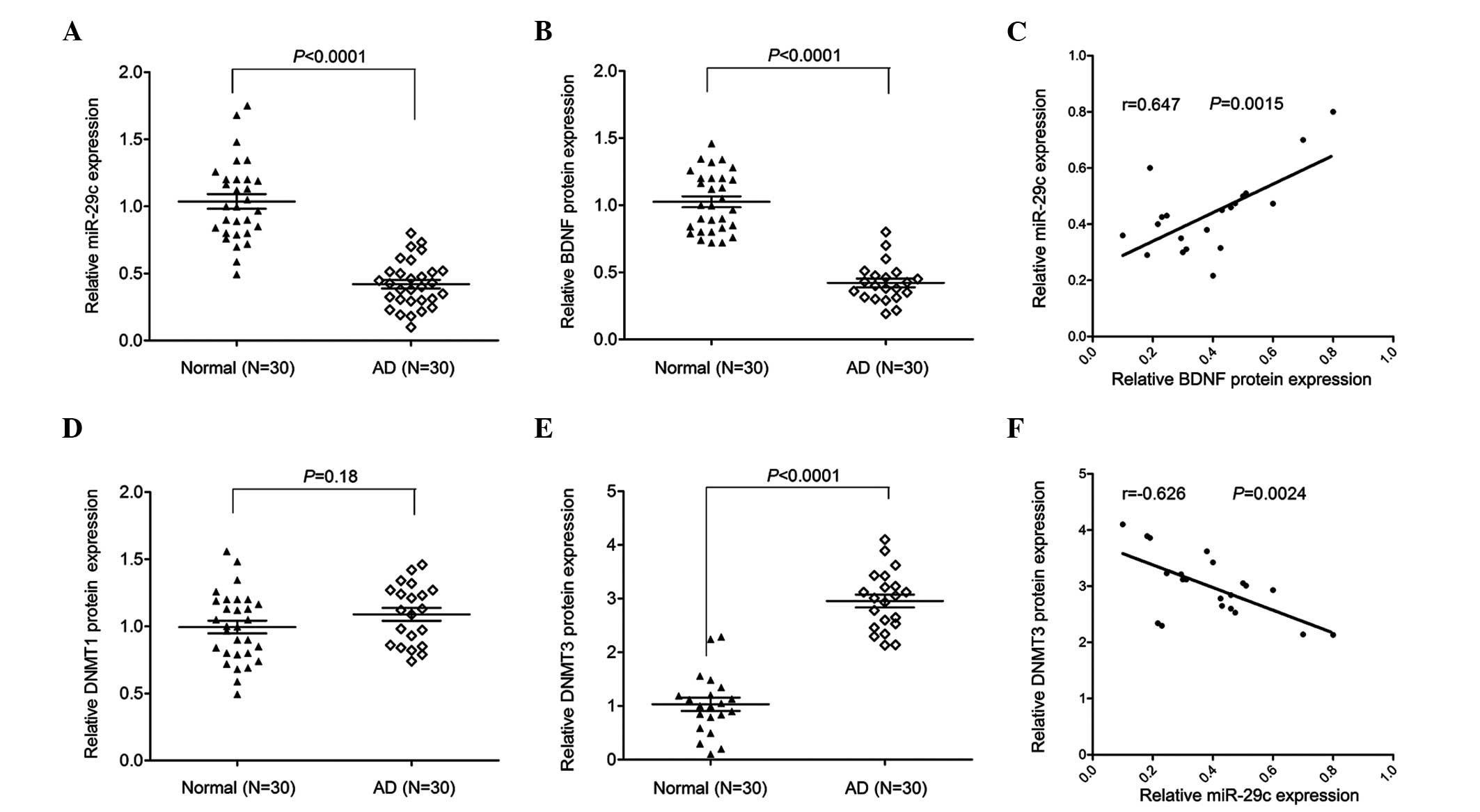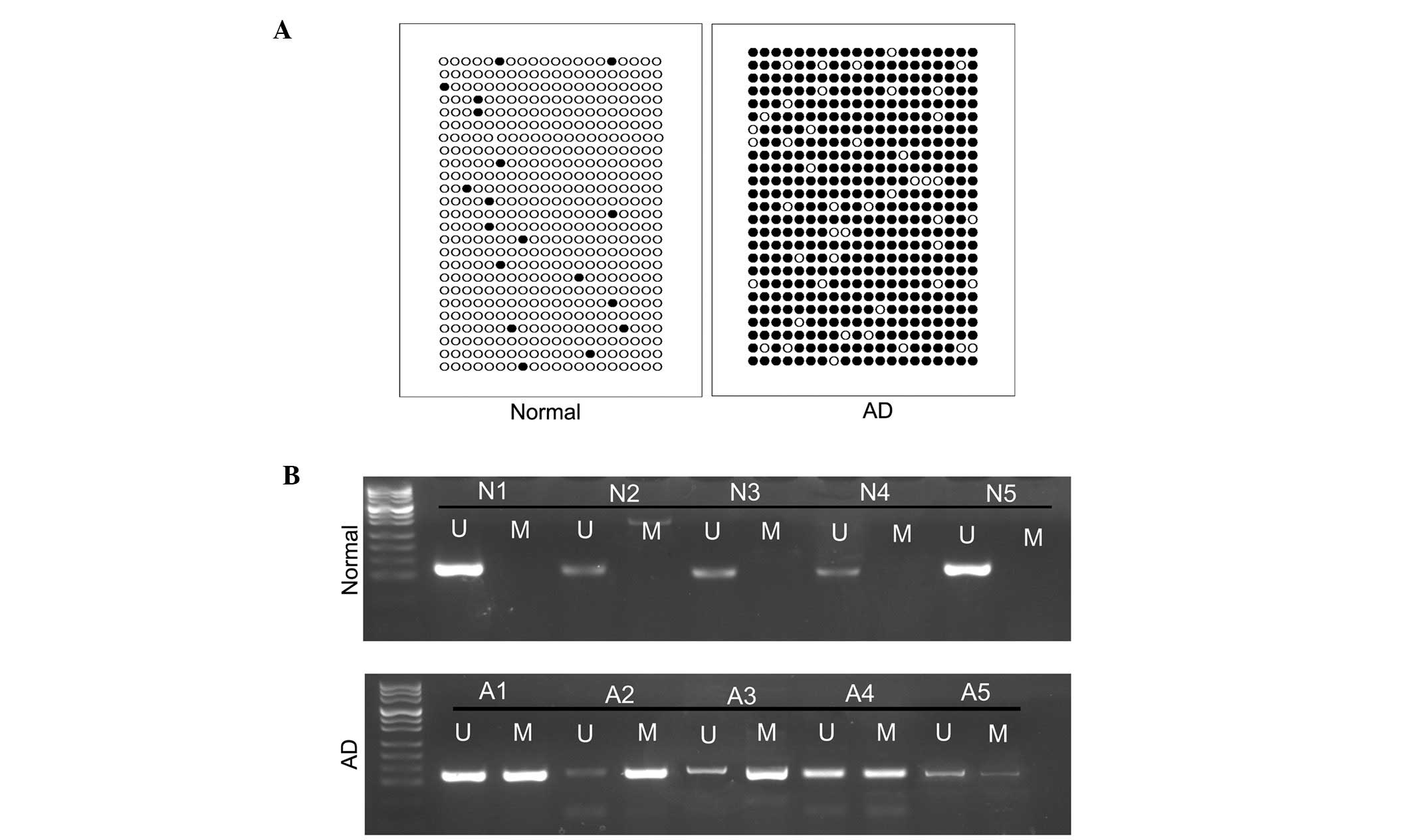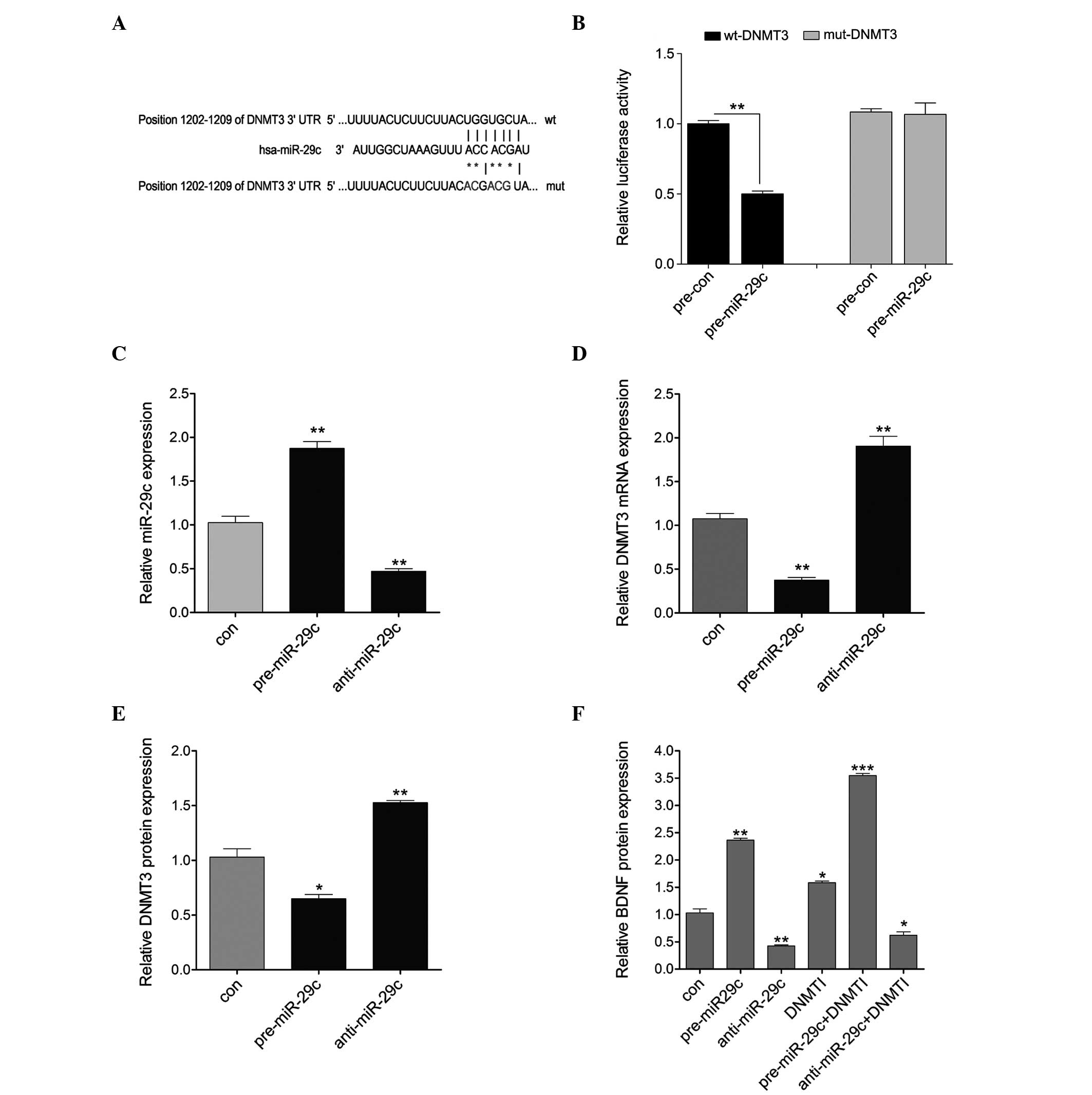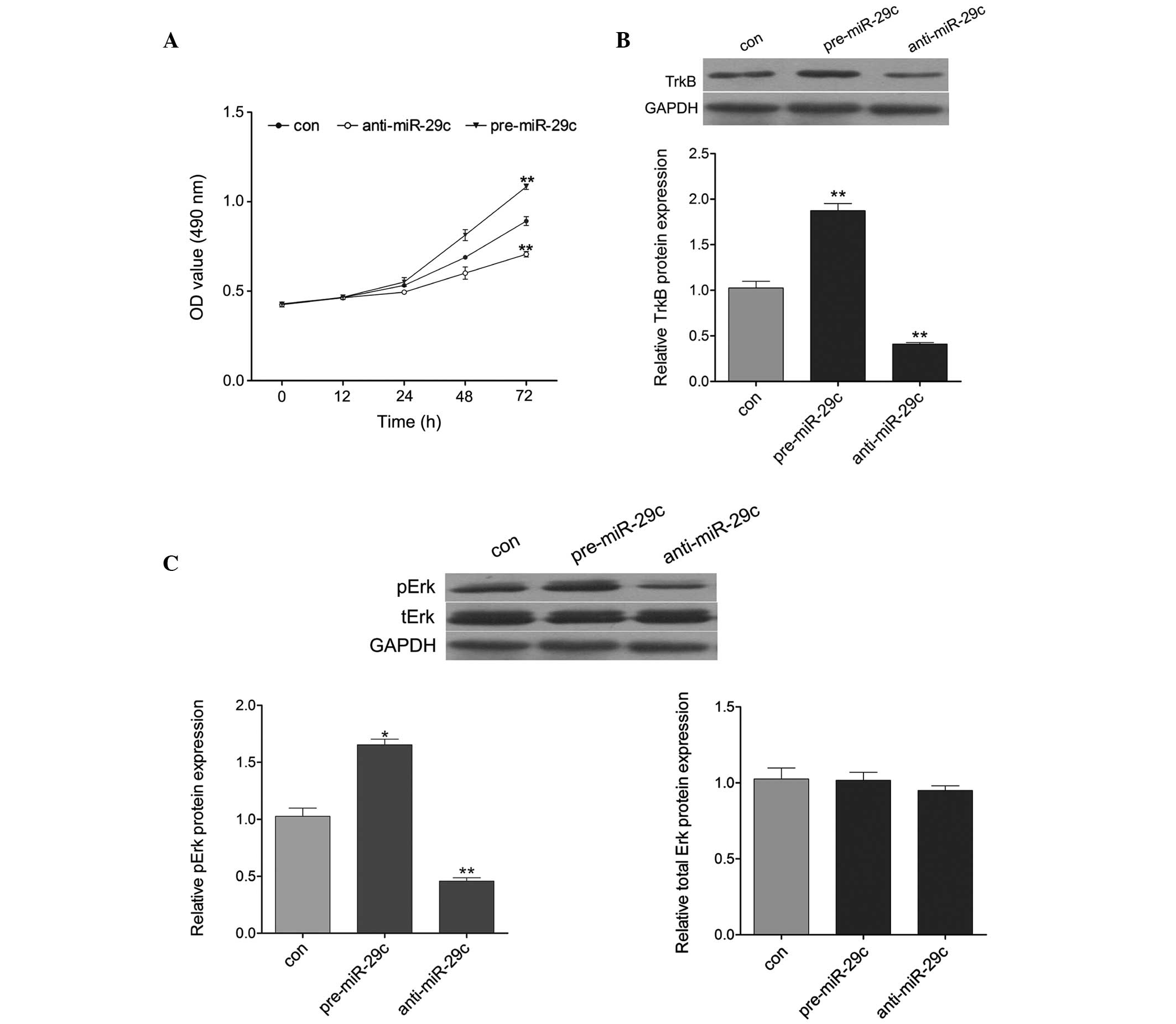|
1
|
Kim DH, Yeo SH, Park JM, et al: Genetic
markers for diagnosis and pathogenesis of Alzheimer’s disease.
Gene. 545:185–193. 2014. View Article : Google Scholar : PubMed/NCBI
|
|
2
|
Morales I, Guzmán-Martínez L,
Cerda-Troncoso C, Farías GA and Maccioni RB: Neuroinflammation in
the pathogenesis of Alzheimer’s disease A rational framework for
the search of novel therapeutic approaches. Front Cell Neurosci.
8:1122014. View Article : Google Scholar
|
|
3
|
Dunkel P, Chai CL, Sperlágh B, Huleatt PB
and Mátyus P: Clinical utility of neuroprotective agents in
neurodegenerative diseases: current status of drug development for
Alzheimer’s, Parkinson’s and Huntington’s diseases and amyotrophic
lateral sclerosis. Expert Opin Investig Drugs. 21:1267–1308. 2012.
View Article : Google Scholar : PubMed/NCBI
|
|
4
|
García-Mesa Y, Pareja-Galeano H,
Bonet-Costa V, et al: Physical exercise neuroprotects
ovariectomized 3xTg-AD mice through BDNF mechanisms.
Psychoneuroendocrinology. 45:154–166. 2014. View Article : Google Scholar : PubMed/NCBI
|
|
5
|
Li G, Peskind ER, Millard SP, et al:
Cerebrospinal fluid concentration of brain-derived neurotrophic
factor and cognitive function in non-demented subjects. PLoS One.
4:e54242009. View Article : Google Scholar : PubMed/NCBI
|
|
6
|
Keleshian VL, Modi HR, Rapoport SI and Rao
JS: Aging is associated with altered inflammatory, arachidonic acid
cascade and synaptic markers, influenced by epigenetic
modifications, in the human frontal cortex. J Neurochem. 125:63–73.
2013. View Article : Google Scholar : PubMed/NCBI
|
|
7
|
Walker MP, LaFerla FM, Oddo SS and Brewer
GJ: Reversible epigenetic histone modifications and Bdnf expression
in neurons with aging and from a mouse model of Alzheimer’s
disease. Age (Dordr). 35:519–531. 2013. View Article : Google Scholar
|
|
8
|
Mastroeni D, Chouliaras L, Grover A, et
al: Reduced RAN expression and disrupted transport between
cytoplasm and nucleus; a key event in Alzheimer’s disease
pathophysiology. PLoS One. 8:e533492013. View Article : Google Scholar
|
|
9
|
Bihaqi SW, Huang H, Wu J and Zawia NH:
Infant exposure to lead (Pb) and epigenetic modifications in the
aging primate brain: implications for Alzheimer’s disease. J
Alzheimers Dis. 27:819–833. 2011.
|
|
10
|
Fuso A, Nicolia V, Cavallaro RA and Scarpa
S: DNA methylase and demethylase activities are modulated by
one-carbon metabolism in Alzheimer’s disease models. J Nutr
Biochem. 22:242–251. 2011. View Article : Google Scholar
|
|
11
|
Imai S, Saeki M, Yanase M, et al: Change
in microRNAs associated with neuronal adaptive responses in the
nucleus accumbens under neuropathic pain. J Neurosci.
31:15294–15299. 2011. View Article : Google Scholar : PubMed/NCBI
|
|
12
|
Pereira P, Sousa Â, Queiroz J, Correia I,
Figueiras A and Sousa F: Purification of pre-miR-29 by
arginine-affinity chromatography. J Chromatogr B Analyt Technol
Biomed Life Sci. 951–952:16–23. 2014. View Article : Google Scholar
|
|
13
|
Zhang J, Hu M, Teng Z, Tang YP and Chen C:
Synaptic and cognitive improvements by inhibition of 2-AG
metabolism are through upregulation of microRNA-188–3p in a mouse
model of Alzheimer’s disease. J Neurosci. 34:14919–14933. 2014.
View Article : Google Scholar : PubMed/NCBI
|
|
14
|
Kong Y, Wu J and Yuan L: MicroRNA
expression analysis of adult-onset Drosophila Alzheimer’s disease
model. Curr Alzheimer Res. 11:882–891. 2014.
|
|
15
|
Pogue AI, Hill JM and Lukiw WJ: MicroRNA
(miRNA): Sequence and stability, viroid-like properties and disease
association in the CNS. Brain Res. 1584:73–79. 2014. View Article : Google Scholar : PubMed/NCBI
|
|
16
|
Spencer P, Fry RC and Kisby GE: Unraveling
50-year-old Clues linking Neurodegeneration and cancer to Cycad
Toxins: Are microRNAs common mediators? Front Genet. 3:1922012.
View Article : Google Scholar : PubMed/NCBI
|
|
17
|
Livak KJ and Schmittgen TD: Analysis of
relative gene expression data using real-time quantitative PCR and
the 2(-Delta Delta C(T)) Method. Methods. 25:402–408. 2001.
View Article : Google Scholar
|
|
18
|
Harvey PD: Clinical applications of
neuropsychological assessment. Dialogues Clin Neurosci. 14:91–99.
2012.PubMed/NCBI
|
|
19
|
Lista S, Zetterberg H, Dubois B, Blennow K
and Hampel H: Cerebrospinal fluid analysis in Alzheimer’s disease:
technical issues and future developments. J Neurol. 261:1234–1243.
2014. View Article : Google Scholar : PubMed/NCBI
|
|
20
|
Peng S, Wuu J, Mufson EJ and Fahnestock M:
Precursor form of brain-derived neurotrophic factor and mature
brain-derived neurotrophic factor are decreased in the pre-clinical
stages of Alzheimer’s disease. J Neurochem. 93:1412–1421. 2005.
View Article : Google Scholar : PubMed/NCBI
|
|
21
|
Laske C, Stellos K, Hoffmann N, et al:
Higher BDNF serum levels predict slower cognitive decline in
Alzheimer’s disease patients. Int J Neuropsychopharmacol.
14:399–404. 2011. View Article : Google Scholar
|
|
22
|
Laske C, Stransky E, Leyhe T, et al: BDNF
serum and CSF concentrations in Alzheimer’s disease, normal
pressure hydrocephalus and healthy controls. J Psychiatr Res.
41:387–394. 2007. View Article : Google Scholar
|
|
23
|
Subramaniam D, Thombre R, Dhar A and Anant
S: DNA Methyltransferases: a novel target for prevention and
therapy. Front Oncol. 4:802014. View Article : Google Scholar : PubMed/NCBI
|
|
24
|
Boersma GJ, Lee RS, Cordner ZA, et al:
Prenatal stress decreases Bdnf expression and increases methylation
of Bdnf exon IV in rats. Epigenetics. 9:437–447. 2014. View Article : Google Scholar :
|
|
25
|
Guo X, Wu X, Ren L, Liu G and Li L:
Epigenetic mechanisms of amyloid-beta production in
anisomycin-treated SH-SY5Y cells. Neuroscience. 194:272–281. 2011.
View Article : Google Scholar : PubMed/NCBI
|
|
26
|
Zhang J, Sokal I, Peskind ER, et al: CSF
multianalyte profile distinguishes Alzheimer and Parkinson disease.
Am J Clin Pathol. 129:526–529. 2008. View Article : Google Scholar : PubMed/NCBI
|
|
27
|
Kiko T, Nakagawa K, Tsuduki T, Furukawa K,
Arai H and Miyazawa T: MicroRNAs in plasma and cerebrospinal fluid
as potential markers for Alzheimer’s disease. J Alzheimers Dis.
39:253–259. 2014.
|
|
28
|
Wang WX, Huang Q, Hu Y, Stromberg AJ and
Nelson PT: Patterns of microRNA expression in normal and early
Alzheimer’s disease human temporal cortex: white matter versus gray
matter. Acta Neuropathol. 121:193–205. 2011. View Article : Google Scholar :
|
|
29
|
Pandey M, Sultana S and Gupta KP:
Involvement of epigenetics and microRNA-29b in the urethane induced
inception and establishment of mouse lung tumors. Exp Mol Pathol.
96:61–70. 2014. View Article : Google Scholar
|
|
30
|
Tong L, Balazs R, Thornton PL and Cotman
CW: Beta-amyloid peptide at sublethal concentrations downregulates
brain-derived neurotrophic factor functions in cultured cortical
neurons. J Neurosci. 24:6799–6809. 2004. View Article : Google Scholar : PubMed/NCBI
|
|
31
|
Jeronimo-Santos A, Vaz SH, Parreira S, et
al: Dysregulation of TrkB receptors and BDNF function by Amyloid-β
Peptide is mediated by Calpain. Cereb Cortex. 2014. View Article : Google Scholar
|
|
32
|
Liu Y, Tao L, Fu X, Zhao Y and Xu X: BDNF
protects retinal neurons from hyperglycemia through the
TrkB/ERK/MAPK pathway. Mol Med Rep. 7:1773–1778. 2013.PubMed/NCBI
|


















